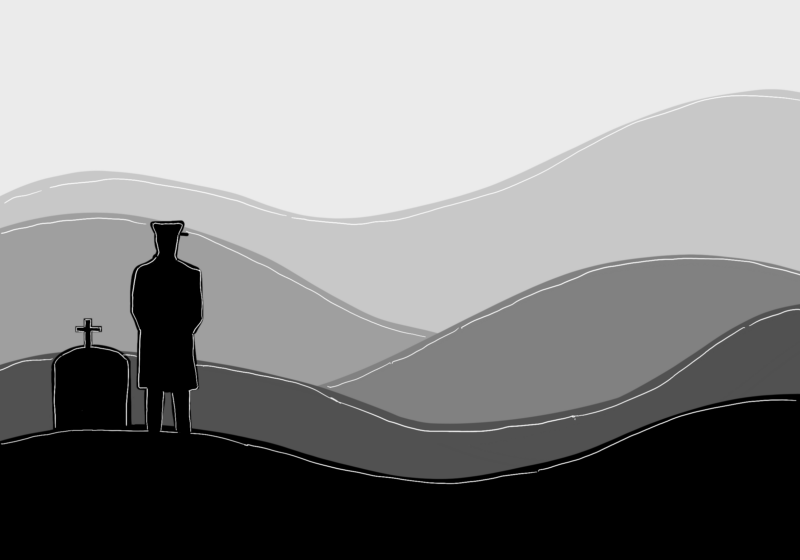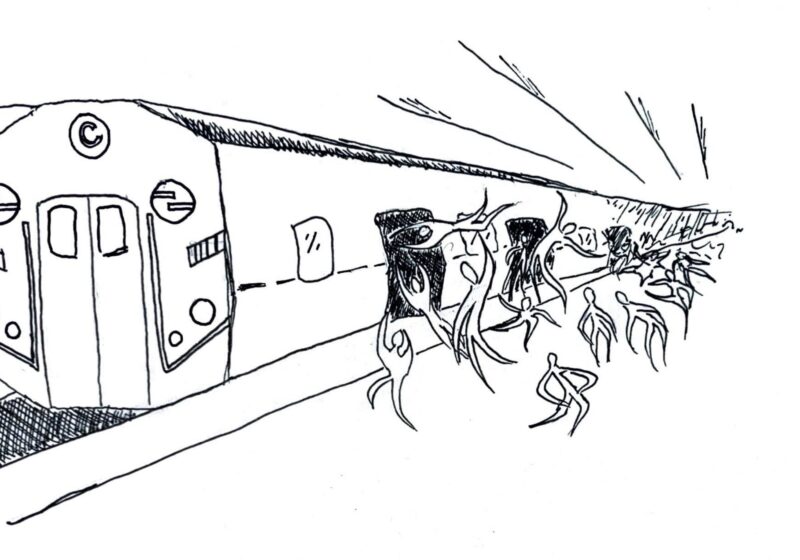“We’ve got like two and a half minutes, Toby,” Carrie Taschman says. Toby Kashket croaks in response.
It’s a Thursday, almost 8 p.m., and the two sophomores are stationed around a horseshoe-shaped desk littered with CDs and papers. Taschman, standing on the inside of the counter, is rifling through a pile of discs. Seated on the outside of the counter, Kashket is typing on her Macbook. Both are in a quiet hurry, behind schedule.
“Shoot, I don’t even know if I remember how to do board, yo,” Taschman says. “You got it, you get right back into it,” Kashket replies. More shuffling—papers, CDs. Kashket’s keyboard clacks.
“It’s the most nerve-wracking part,” Taschman says, drumming her fingers, now waiting on the edge of a rolling chair. She and her partner are both poised before craning microphones, silent.
A button clicks. “You are listening to 88.5 FM, WRUR-FM,” comes Taschman’s voice. She reads from a scripted introduction on paper. Acoustic guitars and tambourines ring out from the speakers fastened above them. Their FM radio show has begun.
WRUR is UR’s student-run radio and television station. It operates in partnership with WXXI Public Broadcasting Council, which runs, among other things, Rochester’s premier NPR member station. Taschman and Kashket, who, along with being DJs, are the music directors for WRUR, host their show, “ Pizza Prty,” every Thursday.
It is their second show of the semester, and they are tucked away in the basement of Todd Union in the FM radio studio of WRUR’s office. You might miss the main entrance of the office, if not for the mosaic of stickers plastered over its door. In the middle of them all lies one saying, “DO NOT BULK.” The FM radio studio’s pockmarked door is sparse by contrast, minus a note that proudly spouts, “Shit Bin.”
On the desk inside the studio sits a sleek grey soundboard, which Taschman is manning tonight, fading songs out and switching others on; it looks like something out of science fiction—buttons, sliding switches, green bars bouncing on screens—and controls almost all the functions of the show: volumes, transitions and the like. Behind the desk, a window looking into an adjacent studio stretches across the wall, a holiday garland draped above it. A few albums and posters look down from their perches above.
“They watch over us and give us strength,” Kashket deadpans, going on to name a litany of other trinkets found around the office: a figurine made of seashells, school photos featuring faces no one knows, a seemingly random biography of rapper T.I. The office is a labyrinth of rooms, hallways and closets, filled with loose cables, on-air signs and CDs—boxes, shelves, piles of CDs. And, though they broadcast from these cramped bunker quarters, Taschman and Kashket can reach listeners miles and miles away.
“Pizza Prty” began in January; it takes its name from a song by L’Homme Run, a defunct rap group fronted by indie rocker Ezra Koenig, who is the lead singer of Vampire Weekend, a band both Taschman and Kashmet adore. The two had each hosted online WRUR shows the semester before, and after bonding over shared music—“Hipster music,” Taschman explains later, “dirty hipster music”—and meeting the requirements, they decided to move to FM radio and co-host a show. Taschman’s decision, in part, was fueled by her family; both her brother and sister worked with FM radio in college, and her brother, a UR grad, hosted a show in the same studio she now sits in.
“And, it seems more real to me,” she adds about FM, her eyebrows jumping in faux-seriousness.
Each of them puts together about an hour of music for every broadcast. The songs they play alternate between playlists, in an attempt to strike a balance between their individual styles. Though their tastes are both rooted in indie, “hipster” music, there are some slight differences—Taschman’s songs are sadder, generally, Kashket’s happier.
Beneath the music, the atmosphere in the studio shifts from silent scrolling on phones and laptops to laughter-filled reminiscing on past episodes. Every so often, one of them whispers a reminder about how much time is left until they need to sit up, pull their mikes close and talk for on-air bits between songs. They talk for around six minutes per broadcast, and their exchanges feature commentary on music, current events, fun facts about popular musicians and scores of little laughs and knowing glances—the physical hints of a kind of running meta-gag. “We like to think we’re funny,” Kashket confesses. Foot taps, desk drumming and head nods all punctuate their musical debates.
Taschman and Kashket’s main objective as music directors is to judge how appropriate the music the station receives every week from promoters is and whether it meets their standards for “good” music. Anything offensive or low quality is tossed aside; the rest is reviewed, ordered and sorted somewhere among the legions of CDs around the office. They hadn’t originally planned to work together as music directors—it used to be a single-person job. But when WRUR executive board elections came about and they both were on the ballot, the organization’s general manager told them they could share it. Clutching hands facetiously at that meeting, they said yes.
It’s narratives like this that bolster the idea—held by many, according to Taschman and Kashket—that the two are indistinguishable. Apart from their similar musical interests and shared WRUR role, they often finish each other’s sentences and banter with an obvious chemistry. When asked about their nervousness while broadcasting, they respond in tandem. “It’s nice because you can pretend no one’s listening,” Kashket says.
“That’s the beauty about that,” from Taschman.
“Of radio,” Kaskhet returns.
“You don’t know your audience,” Taschman says. “You can’t see them.”
Later, Taschman takes the concept a bit further, saying, “I like to joke that we’re forming a collective conscious.” She asks Kashket what she’ll do without her, if she studies abroad. “Slowly die in the studio,” Kashket replies.
Early on in the night, as one of their first songs hushes to a murmur, the two outline a manifesto of sorts.
“My favorite thing about Toby and I is that girls in radio aren’t as common as guys are, and when you have two [similar]-looking, short [sophomores] who run a show together and are also the same e-board position, I have this theory that no one knows the difference between us,” Taschman says, as acoustic guitars begin to strum.
“Basically,” Kashket says in turn, “our plan is to keep moving up the ranks and be co-general managers, never do a job by ourselves.”
“Why bother, you know,” Taschman concludes, returning to her CDs as the song crescendos and the singer croons, “We all are your friends.”
The next Thursday evening in the studio, seven neat stacks of CDs sit on the counter. The deadline rush of last week’s show has vanished; Taschman and Kashket are prepared and ahead of schedule. In opposite roles this time, Kashket is on the soundboard, and Taschman is sitting with her laptop, managing the song roster and online schedule. Who does what depends on the week and how they’re feeling.
“It gets boring doing the same thing every time,” Kashket says.
Like Taschman, she sits on the edge of her seat. Despite their preparation, though, the online stream of their show is failing for some reason, and their calm falters.
“Why us,” Taschman wonders, her tone half-serious. “So many people told me they’d listen tonight. This is the worst!”
She leaves to try to find someone to fix the issue, and when she comes back through the studio door, her partner suddenly realizes they’re wearing matching black and white outfits—“Oh my god, Carrie,” she laughs.
Taschman and Kashket deejay not just because they love music, but because they love sharing it with others, too, even if they think their audience is mostly just their parents and truck drivers who’ve randomly happened upon their station. “It’s a way for me to force people to listen to the music that I like, rather than stealing the aux cord in my friends’ cars,” Taschman quips in explanation.
Kashket emphasizes how’ve they’ve benefited from this exchange, too, saying they’ve “broadened each other’s horizons” and introduced each other to artists they would have never found otherwise. It’s also exciting, Taschman adds, when people they don’t know approach them with compliments about their show. Interactions like this soothe any worries that radio might die out on campus. “I think people are always going to think it’s cool,” Taschman says.
As the show’s second-to-last song ends, Kashket fades the music out and hits a button on the soundboard. Click. “You’re listening to the ‘Pizza Prty’ on 88.5 WRUR,” she says into her silver mike. She and Taschman recap the previous songs, self-deprecate to their anonymous audience about their hipsterism and then segue into their goodbyes.
“Thank you all so much for listening,” Taschman says, “and be sure to tune in every Thursday.”
“Every Thursday, 8-10,” Kashket adds. “For the best music—”
“Best DJs—”
“Best time: ‘Pizza Prty,’” Kashket says.
“‘Pizza Prty,’” her friend echoes into her mike. “Grab yourself a slice and tune on in.”




